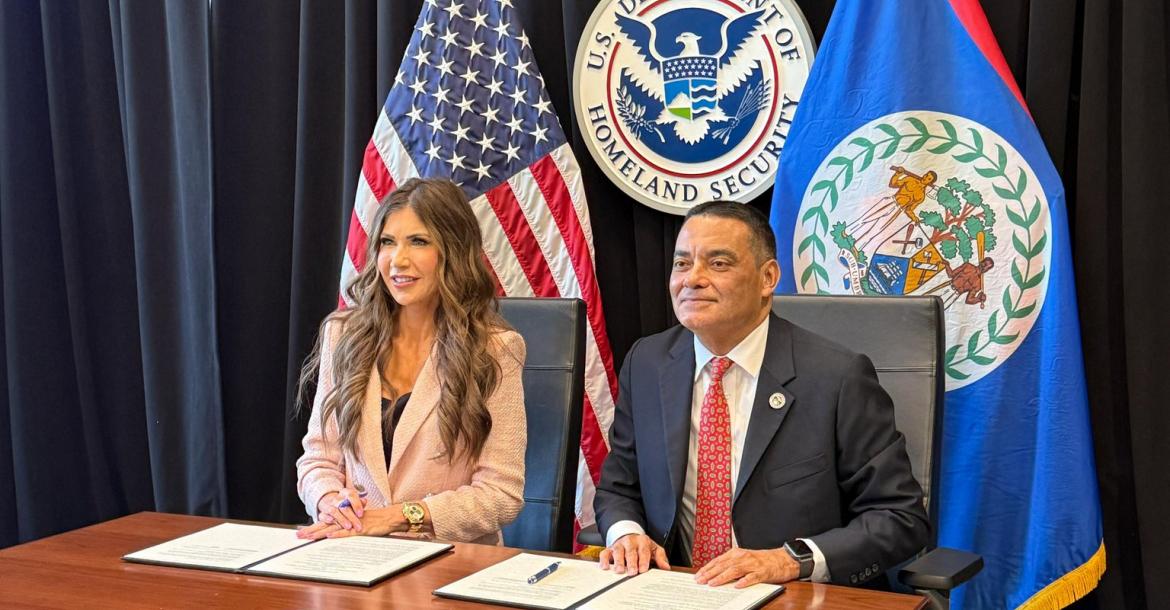Naked Before a Foreign Power: Briceno Administration Surrenders Belizeans' Biometric Data to the United States
By: Omar Silva I Editor/Publisher
National Perspective Belize I Digital 2025
Belize City: Thursday 24th July 2025
In a move that has stunned advocates of national sovereignty, the Government of Belize — through Foreign Minister Francis Fonseca — has signed a biometric data-sharing agreement with the United States, giving the U.S. government unprecedented access to the personal, private, and biometric information of Belizean citizens.
The agreement, signed in Washington, D.C., with U.S. Secretary of Homeland Security Kristi Noem, is described as a “Memorandum of Cooperation” aimed at enhancing border security and public safety through the exchange of information. But what’s buried beneath this diplomatic language is a stark and alarming truth: Belize will now share its most sensitive personal identification data — including biometrics — with a foreign power.
According to the U.S. Embassy in Belize, the agreement “lays the groundwork for a Biometric Data Sharing Partnership to help Belize develop new border management tools to combat illegal immigration and transnational criminal organizations.”
This development has come at a time when Belize is only beginning to roll out a national ID system that includes biometric features. CEO of E-Governance, Jose Urbina, claims that the system will have safeguards — but the timing of this deal with the United States raises serious concerns.
At what price does partnership come when a sovereign country strips its people of privacy and places their biometric information in the hands of a foreign power?
A Government With No Mandate for This
At no point were Belizeans consulted. There has been no debate in the House of Representatives, no presentation before a bi-partisan national security committee, and certainly no referendum or mandate from the people for this kind of surrender.
Did Belizeans vote for a government or a puppet administration governed by the geopolitical whims of a foreign superpower?
For a nation that gained its Independence in 1981, the Briceño administration’s decision to sign over citizen biometric data to the United States — a country whose track record on surveillance and civil liberties has raised alarms worldwide — is not only reckless, it is humiliating.
This move echoes the dark practices of digital colonialism, where small nations are pressured — or bribed — into giving away access to sensitive data systems under the guise of “security cooperation.”
Digital Surveillance in Disguise
Let us not be fooled. This is not just about border security or public safety. The agreement paves the way for Belize to become a digital outpost of the U.S. surveillance state.
Who will Belizeans turn to when mistakes happen — when innocent citizens are flagged, tracked, or denied services based on erroneous data profiles passed on to or stored by a foreign government?
Where are the legal protections? Who controls the servers, the cloud infrastructure, the access logs? Is Belize building digital sovereignty, or simply becoming a client state in a biometric empire?
Urbina’s Reassurance Is Not Enough
Jose Urbina, the government’s point person on the National ID rollout, insists that "security layers" will be built into the system. But without independent oversight, legislation, or judicial review, such claims ring hollow.
There can be no security when the government’s first move is to hand over access to a foreign entity.
The new National ID — once a hope for improved governance, service delivery, and national dignity — is now cast under a dark shadow. What could have been a pillar of Belizean modernization has now been turned into an instrument of external control and internal mistrust.
A Warning and a Call to Action
This biometric agreement was signed behind closed doors. It did not arise from a people's demand. It came from a government that has repeatedly shown it would rather follow foreign prescriptions than build national consensus.
The Belizean people deserve to know:
- What specific data will be shared?
- For how long?
- With what safeguards?
- Under what oversight?
And most importantly: Why were we not asked?
The Briceno administration has crossed a line. The people of Belize must now draw their own.
- Log in to post comments

